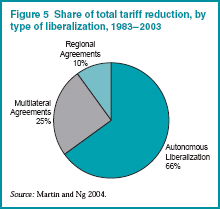 Tyler Cowen gives CAFTA a very qualified endorsement which I mostly agree with. The clincher:
Tyler Cowen gives CAFTA a very qualified endorsement which I mostly agree with. The clincher:
Failure of the treaty would be a disaster, again for symbolic reasons. Trade negotiations would slow down significantly, and the age of trade agreements might be over.
What age of trade agreements? According to the World Bank’s World Economic Prospects: Trade, Regionalism, and Development unilateral trade liberalization accounts for two thirds of tariff reductions over the past twenty years. Regional agreements like CAFTA only accounted for ten percent.
Downgrade symbolism and upgrade strategy: unilateral free trade is the way forward, followed by worldwide agreements, the latter spurred by the former. And drop the non-trade stuff, like exporting intellectual protectionism.
Still, I find it hard to not root for CAFTA, if only because the economic neanderthals on the other side are so ugly.
(CAFTA is doubtless a very ugly treaty too, with payoffs and exceptions galore. Dare I say that those pursuing treaties rather than unilateral liberalization overestimate public good problems and underestimate rent seeking problems?)
[…] I’d really prefer to give entirely outside the U.S. and other wealthy jurisdictions. However, I’m not interested in any organization that gives direct aid (reactionary, low long term impact), supports education (feel good, low long term impact), exhibits economic neanderthalism, has religious or social conservative ties, or is a shill for U.S. foreign policy in the areas of drugs, terror, or intellectual property. I am looking for organizations that support autonomous liberalization or any of the goals exemplified by the organizations I already support above. Suggestions? […]
[…] classes of trade barriers simply provides an excuse for “retaliatory” protectionism. Autonomous liberalization does the most good, and I suspect that’s as true of free speech as any other area. On the […]
[…] total factor productivity can increase, and people in all places should strive to do so (best autonomously) — that’s approximately what “development” is about — results are […]
[…] and inequality promoting practices. I’m not a fan, especially considering that non-treaty autonomous liberalization has for decades been the main source of trade barrier reduction. I’m amused that contributors […]
[…] Autonomous Liberalization. Independent reforms may in the short term produce more quantifiable gains than multilateral and regional agreements, but this is a penny-wise, pound-foolish analysis. Multilateral, regional, and global agreements (and this ought be generalized to all such agreements, not only trade) set the norms and expectations for all to strive toward, beyond mere agreement compliance, set the stage for further agreements, are more robust than self-directed reform which may be repealed at a whim, and develop crucial institutions of regional and global governance. […]